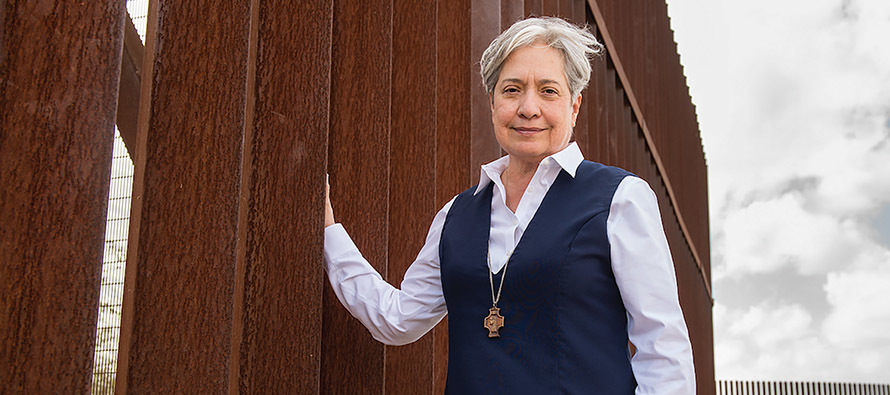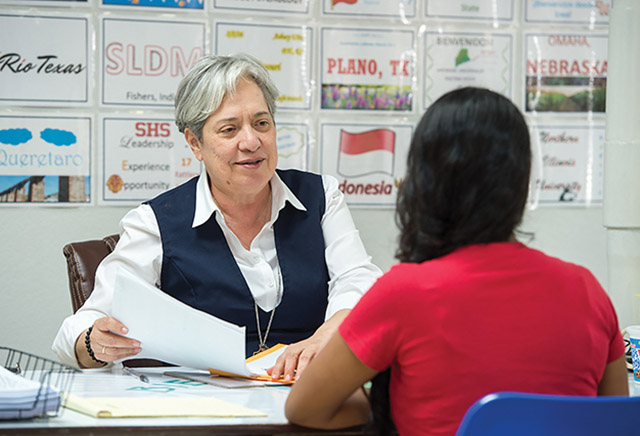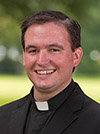Sister Norma Pimentel takes our questions

Sister Norma Pimentel, M.J. has become widely known for working with and advocating for immigrants at the U.S. border with Mexico. (Courtesy of the University of Notre Dame/Barbara Johnston.)
A few years ago Pope Francis gave Sister Norma Pimentel, M.J. a shout-out during a televised papal audience. In an unscripted moment he asked to speak directly to her, then thanked her and all Catholic sisters in the United States for their good works. At that moment the world became more aware of Pimentel’s humanitarian work at the U.S. border. Pimentel, who is director of Catholic Charities of the Diocese of Rio Grande, Texas, has been attending to the needs of poor people at the border for decades. That papal spotlight put her on the map, however, and she has since become a minor celebrity, winning multiple awards and fielding many media requests to speak about the human face of immigration. She consistently reminds people of the inherent dignity and rights of the migrants she and her team minister to.
Ironically, Pimentel’s own commitment started, she told Elle magazine, because she wanted to go out for pizza with friends. She attended a parish prayer event—which was followed by a pizza social—and experienced God’s love in a profound way. That faith experience eventually led her into religious life with the Missionaries of Jesus.
You’re a bit of a celebrity, Sister Norma. How does that feel?
It feels great. But at the same time, if I stop to think about why I’m getting all of this attention, it makes me feel uncomfortable, because it comes from the suffering and pain of so many families. But the publicity brings attention to these problems. It emphasizes that there is this pain and suffering.
I’ve received so much recognition. It gives me a voice, which comes with big responsibilities, of saying what it is that we all should know and do.
How did you decide to enter religious life?
That’s some time back! I didn’t decide for myself, but God decided to pull me out of the direction I had been going. I was all set on pursuing a professional career as an artist. I stopped to take some time back home so that my dad would be okay with me moving on. In the meantime, I went to a prayer group—in part for the pizza social afterward—and in that prayer group, that’s where things changed for me. For the first time I was experiencing the presence of God in a very special way that caught my attention. And it caught my attention so profoundly that my life took a 180-degree turn to get more involved with knowing God and serving Him with a religious community. A local religious community invited me to a vocational retreat, and the rest is history.
Did you have a sense of what God was calling you to do specifically?
No, it was all an unknown future for me. All I knew was that it was the right thing to do. And I wanted to know more about God and what it meant to serve Him. It was something that was unfolding in my life, and I wanted to explore it and allow God to guide me. That’s where it all started. It has been an interesting journey of discovery, of living out my faith and growing in my faith as I move forward. I allow God to guide me in what I do and who I am.

What has it been like to be a leader in the church as a woman?
I think it’s important to be yourself and not be afraid to be anything other than yourself and who God is forming you to become. It helps to be able to relate to people you work with and those you are inviting into the conversation. There is a sense of respect for one another; we may agree on some things and disagree on others, but in those things we do agree on we can work together to respond to whatever is before us. We focus on what we both believe is the right thing to do. That’s how things start to happen.
You mentioned about being a woman, and that can get in the way when we think that we might not be recognized or respected because we’re women. But I believe from my own experience that people have come to respect me for who I am and not because I’m a woman or a religious or anything other than us doing the right thing.
Conversations about immigration are difficult. How do you approach them?
I once spoke at a gathering of consulates where I was one of two speakers, along with the head of Border Patrol. He presented on the importance of border security and told what his job was. And when I spoke, I said that I was going to talk about another vital element of life on the border: the need to respond humanely to the reality we see among immigrants in the Rio Grande Valley, among families entering this country fleeing persecution. I think some people need to spend one day with me and see for themselves. I think the power of such an encounter would really open many hearts and minds to the human reality of families desperately seeking protection.
What would people see if they spent a day with you?
They would see the presence of God right there. That’s why those who volunteer, something happens to them as they see the families, the children, the mothers, and they reach out and help them. That moment of connection when both of them come together and meet: Right at that moment I believe that God becomes present. They experience it. Someone once came to me and said, “I’m not Catholic. When you started this humanitarian movement, there was a friend of mine who was a very successful attorney who went to see what you were doing at Sacred Heart and became involved. And it changed him so much that he left his career and joined the seminary.” Another individual recently said to me, “Sister, I have been away from the church, and since my experiences in helping these families, I’ve come back to the church.” To me these are extremely powerful experiences. I think that it’s God who becomes present to them in their lives.
What would you say to people who don’t know anything about how God works on the border?
Before 9/11, it was so common to go back and forth [across the border], half of your family on the U.S. side and half on the Mexican side. Now it’s so difficult to go back and forth. To realize the anguish and fear among the families, that you may have family members on the Mexican side, and be worried about them because of the cartels and gangs and things like that. You hear the stories, and you can only be in solidarity with their pain, and know that it is not easy for them to live that life. Those are the realities for many families in South Texas.
At the same time, here at the Rio Grande Valley is a community that celebrates life and faith. You see that when it comes to celebrating Advent, Christmas, or Ash Wednesday, especially Ash Wednesday! Everyone seems to go to church on that day. When someone dies in the family. Those are special moments when we become one with each other. They help us feel that we are one with God and one with one another.
What dreams do you have for the church in the future?
I believe that we must stand together in the values and principles that we believe in, that we should not hold back from speaking out and living our faith, especially when we see things that are not right. Our responsibility as Christians is to defend the rights and dignity of those who are most vulnerable and powerless in our society, and it’s not OK to be quiet. Sometimes fear can blind us to the true reality that we are all one in God. As one people we can stand together and feel the courage to do what is right: That is what the church of tomorrow should be like.
This article is adapted with permission from “Embodying Mercy: An Interview with Sister Norma Pimentel, MJ” on thejesuitpost.org. Related article: VocationNetwork.org, “A searing presence.”
Tags
Related
- Seeing God in a child’s smile: Profile of Sister Marie Elizabeth Jerry, S.S.F.
- Bringing sacred healing to hurting communities
- Sisters help Uvalde move from trauma to trust
- Camaraderie at its best: Profile of Sister Kristine Fernandes, C.S.J.
- My millennial response to a perennial call
- Goodbye L.A., hello heartland: Profile of Sister Jessica Vitente, S.P.
- A zigzagging road to the convent
- Sister Maggie has a mission
- Living simply, centered on prayer
- Sisterhood is different from singlehood Read More
Most Viewed
- Find your spirituality type quiz
- FAQs: Frequently asked questions about vocations
- Celibacy quiz: Can you live a celibate life?
- Resources for older discerners or those with physical and developmental differences
- About Vocation Network and VISION Guide


